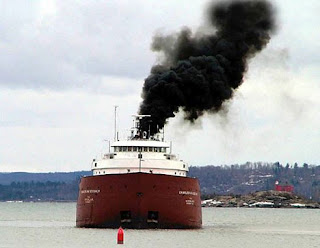Guardian, John Vidal, environment editor, Monday 18 July 2011
 |
| Maritime countries have agreed to regulate shipping emissions – but campaigners warn the rules don't go far enough. Photograph: David Levene for the Guardian |
Countrieshave taken a first step towards reducing climate emissions from shipping with aglobal agreement to reduce energy use in new vessels from 2013 onwards.
The belatedaction on Friday by 55 of the world's biggest sea-faring nations meeting at UN's international maritime organisation in London will force all ships over400 tonnes built after 2013 to improve their efficiency by 10%, rising to 20%between 2020 and 2024 and 30% for ships delivered after 2024. The first everregulation of emissions in shipping is expected to lead to greenhouse gasemission reductions of 45-50m tonnes a year by 2020.
But China,Brazil, Saudi Arabia and South Africa have secured a six and a half year delayfor new ships registered in developing countries, which could mean the firstguaranteed effective date of the reform will be in 2019. Shipping accounts for3-4% percent of man-made CO2 emissions worldwide and this figure is expected torise to 6% by 2020, with emissions doubling by 2050 if no action is taken. Shipowners,who traditionally do not pay for the fuel that their ships use, have longresisted any regulation despite increasing pressure from environmental groupsand reformers within the industry.
EnvironmentalNGOs welcomed the tightening of the energy efficiency design index (EEDI)standard but cautioned that because it only applies to new ships replacingolder ones at the end of their long lives, the full effects of today's decisionwill take a long time to have any major impact. There is a significant danger,said some, that many shipowners will elect to have their new ships flagged indeveloping countries that provide a waiver.
"Today'sdecision should result in fuel savings of $5bn a year by 2020 and CO2reductions of 22m tons. This is an unprecedented economic and environmentalopportunity and the IMO has taken an important step forward", said PeterBoyd, COO of Carbon War Room.
If the samestandards were applied to the existing fleet of more than 30,000 ocean-goingships it could save $50bn a year in fuel and 220m tons of CO2, he said.
"Therewill be no change to existing ships which are currently pumping out a billiontones of CO2 each year, and for new ships it will take another dozen yearsuntil the EEDI is really delivering benefits. Operational changes could bedelivering major benefits today," said Jacqueline Savitz, the seniorcampaign director for the marine conservation NGO Oceana.
Theefficiency improvements are expected to be met through better engine design,more efficient hull shapes, improved waste heat recovery systems and the use ofhull coatings to make ships more "slippery".
The deal isnot likely to satisfy the European Commission that the maritime organisation issuccessfully regulating greenhouse gas emissions. The EC is therefore expectedto proceed with its threat to bring shipping into the Emissions Trading Scheme,as it is doing in aviation, where there have been recent legal challenges fromnon-European countries.
In aseparate development on Friday, the European Commission said it plans to tighten ship fuel sulphur regulations, which should lead to public healthsavings of billions of dollars, especially in countries like Britain andHolland that border busy sea lanes. The proposal would cut the maximumpermissible sulphur content of fuels to 0.1% from 1.5% from 2015 in sensitiveareas such as the Baltic Sea and the Channel, and to 0.5% from 4.5% in allother areas from 2020.
Shippingburns some of the most polluting fuels, and the proposal is expected to fineparticle emissions from ships by up to 80 percent, the commission said.
Theexpected cost to the shipping industry of the new standards is between €2.6bnand €11bn ($3.7-$15.6bn), which the EU executive argues would be far outweighedby public health savings, of up to €34bn
 |
| Waiting game: Tankers moored off Devon waiting for oil prices to rise even further |
